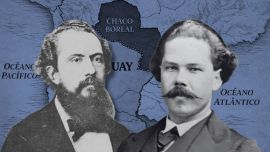Almost 20 years ago, when the economy crashed and millions of hard-pressed men, women and children suddenly found themselves looking for edible scraps among the rubble, angry mobs stalked the streets shouting abuse at the men and women they had entrusted with the country’s fate. For a few weeks, politicians did their best to remain out of sight but, luckily for them, it was soon realised that it would be all but impossible to replace the entire political class with one much better and allowed them to return to their old haunts. From then on, it would be business more or less as usual.
Most Argentine politicians are populists in the traditional sense of the word. They affect to stand for “the people” in its endless struggle against “oligarchs” and the like, often in league with sinister foreign interests, who allegedly seek to deprive honest folk of what is rightfully theirs and reduce them to slavery. This pretence has enabled them to enjoy a standard of living, and a level of security, which is higher than that of the bulk of their compatriots, but it has also made it far harder for them to manage the economy in a sensible manner. Populists are by nature short-sighted because they feel obliged to give people whatever they want and fear that going on about the need to put aside something for tomorrow would cost them many votes.
In Europe and North America, political moderates of the left, right and centre have recently taken to warning us about the dangers posed by populism as represented, they say, by Donald Trump, Boris Johnson, Matteo Salvini, Marine Le Pen, Jair Bolsonaro and, needless to say, our own Cristina Fernández de Kirchner, all of whom they accuse of lying through the teeth by promising far more than they can possibly deliver. This may seem fair enough, but in democratic countries the feelings of “ordinary” people have to be taken into account, and much of what they are demanding is perfectly reasonable. So too, for that matter, is the resentment occasioned by the willingness of members of the local elites to treat them with disdain as though those who disagree with them are all mentally-challenged idiots happy to be led astray by cynical demagogues.
If Argentina’s experience is anything to go by, in the rest of the world populists are likely to dominate the political stage for a long time to come. By making out that they always stand shoulder to shoulder with the “people” against their many enemies, Peronists and, to a lesser extent, Radicals have long contrived to hold onto power, and the many perks that go with it, despite their all too evident inability to run the country with a minimum of efficiency, hence Argentina’s slide from being one of the world’s most prosperous nations into one that is lagging ever further behind some of its neighbours. Their survival skills are such that they have much to teach foreign politicians who, whether they realise it or not, in many cases face a future in which economic growth is likely to be sporadic at best and growing swathes of the population will depend on public largesse to stay afloat.
However, though Argentina’s political establishment has managed to survive almost intact for many years despite boasting a track record that is among the worst in the modern world, some suspect it could now be approaching the end of the road. Unless Alberto Fernández succeeds in turning the economy around within six months or so, the country could find itself back where it was in late 2001 and early 2002: flat broke, with a huge number of people previously unacquainted with real poverty barely getting enough to eat and irate foreign creditors banging at the door.
The task facing the man Cristina chose to put in the Pink House is a daunting one. He must defend the corporatist economic model that was put together many years ago by Juan Domingo Perón and the political class which depends on it. He may have doubts as to its viability, but he knows that any attempt to restructure it could provoke a political backlash he would be unable to control. Like Mauricio Macri before him, he feels he has little choice but to go slow and hope that the economy starts performing so vigorously he can then go about slimming down the pathologically obese public sector without anyone noticing what he is up to.
Argentine populism works by funnelling money taken from productive sectors such as farming, industry and services of one kind or another towards unproductive but politically valuable ones. Of course, much the same happens in all other countries, but here the redistribution process went into high gear three-quarters of a century ago and never really looked back. Half-hearted efforts to reverse it have had little effect. The result, as some worried politicians, among them Macri’s running-mate Miguel Ángel Pichetto, have pointed out, has been a grotesquely unbalanced situation in which the people who put money into the system are greatly outnumbered by those who only take it out.
This is not about to change. For what may be described as political reasons, Fernández – who fears a genuine attempt to rein in public spending would lead to large-scale street protests by the usual suspects supplemented by contingents from the 40 percent of the electorate who voted for Macri – wants to increase government handouts while raising taxes on farming and other activities in the hope that, if the poor spend more, business will at long last take off, a formula sceptics call “trickle-up,” an upside-down version of the “trickle down” economics favoured by Ronald Reagan’s administration in the United States.
Can it work? Unless it does, Argentina is in for a period of turmoil that could prove to be every bit as bad as the one which followed the collapse of the currency-board system, with the difference that this time around there is little chance of China’s voracious appetite for soybeans and the like setting off a commodity boom that would suddenly make everything far easier. Would a meltdown like the last one be enough to bring about meaningful political reforms? Only if the “cultural change” hopeful supporters of Macri talked about when the outlook still seemed promising, turns out to be rather more than a product of wishful thinking.



















Comments